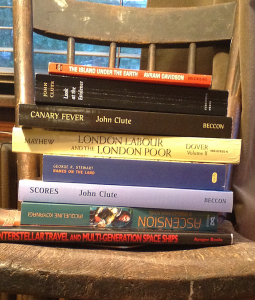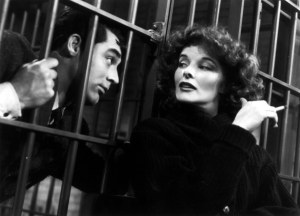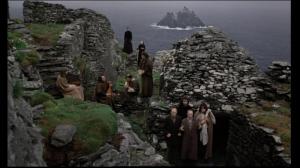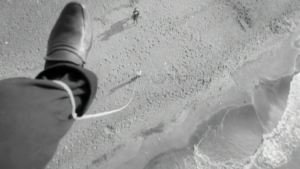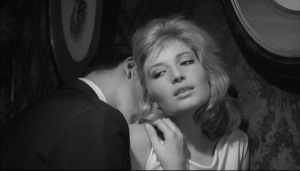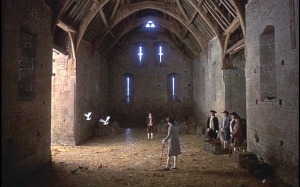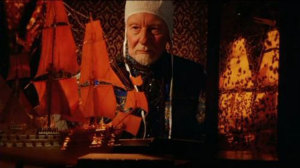Attempting to impose a modern medical interpretation upon symptoms that have long since carried away their sufferers is always a chancy affair, and the older the facts the more dubious the conclusion.
Consider the case of Elizabeth Kelly, eight years old.
I. Sunday 23 March 1662
Elizabeth attends meeting 9 a.m. to noon. She then goes with Goody Ayres to the Ayres home, where Goody Ayres “did take broth hot out of the boiling pot and did immediately eat thereof and did require our said child to eat with her the same […] whereupon she began to complain of pain at her stomach for which pain I gave her a small dose of the powder of angelica root which gave her some present {=immediate} ease.”
They return to the meeting, then home. Elizabeth “did not much complain at her return home, but three hours in the night next following the said child […] did suddenly start up out of her sleep and holding up her hands cried: Father! Father! Help me! Help me! Good Wife Ayres is upon me. She chokes me. She kneels on my belly. She will break my bowels. She pinches me.”
II. Monday 24 March
These outcries against Goody Ayers and symptoms of pain and discomfort continue most of the night and the following Monday. “We used what physical helps {=herbal medicines} we could obtain, and that without delay, but could neither conceive, nor others for us, that her malady was natural.” (The deponent here and above is Elizabeth’s father. I do not have access to the original document; I am quoting from a modernized version given in R. G. Tomlinson, Witchcraft Prosecutions. The editorial glosses are mine.)
III. Tuesday 25 March
“In this sad condition she continued until Tuesday.” There is a temporary respite of the symptoms: “While the said Ayres was there, the child seemed indifferent well and fell asleep.”
IV. Wednesday 26 March
“The said Ayres departing, the child was more quiet till midnight. Then she broke out fresh, as before, against Goody Ayres. […] In this plight she continued until Wednesday night and then died. At last spake was, Goody Ayres chokes me. Then she was speechlessness.”
V. The inquest, 28 March?
“Wee whose names are under written, were called forth and desired to take notes, of the dead child of John Kelly, doe hereby testifie, what wee saw as followeth: the child was brought forth and layd upon aforme, by the good wife Aeres and good wife waples, and the face of it beinge uncovered good wife Aeires was desired, by John Kelly to come up to it and to handle it; the child havinge purged alittle at the mouth the goodwife Aeires wiped the corner of the childs mouth with acloth, and then shee was desired to turne up the sleeve of the arme and shee did indeavour to doe it, but the sleeve beinge some what straight, shee could not well doe it. then John Kelly himselfe ripped up both the sleeves of the armes {text crossed out} and upon the back side of both the armes, from the elbow to the top of the shoulders were black and blew, as if they had bin bruised or beaten, after this the child was turned over upon the right side and set upon the belly, and then there came such a sent from the corps, as that it caused some to depart the roome, as Gregorie wolterton, and George Grave, then the child being turned again, and layd into the coffin John Kelly desired them to come into the roome againe, to see the childs face, and then wee saw upon the right cheeke, of the childs face, a reddish tawny great spott, which covered agreat parte of the cheeke, it beinge on the side next to goodwife Aeires where shee stoode, this spot or bloach was not seene before the child was turned and the armes of the child did apeare to be vere limber, in the handlinge of them; Thomas Catling Gregory wolerton {illegible} Thomas Bull Joseph Marsh Nath willet George Grave” (Samuel Wyllys Papers, Case of Goody Ayers: Testimony of the Inquest Committee)
VI. The autopsy, 30 March?
Performed at the graveside by Dr. Bryan Rossiter, who presented his report on 31 March. This is the first recorded autopsy in Connecticut, and perhaps the second in New England, and it will be apparent that Rossiter had little experience with dissection, or even of cadavers at all. Here is his report in full:
“All these six particulars underwritten I judge preternatural: Upon the open of John Kelly’s child at the grave, I observed:
“1. The whole body; the musculous parts, nerves and joints were all pliable, without any stiffness or contraction, the gullet only excepted. Experience of dead bodies renders such symptoms unusual.
“2. From the costal ribs to the bottom of the belly, in the whole latitude of the womb, both the scarf skin {=epidermis} and the whole skin with the enveloping or covering flesh {=peritoneum} had a deep blue tincture, whereas the inward part thereof was fresh and the bowels under it in true order without any discoverable peccancy {=disease} to cause such an effect or symptom.
“3. No quantity or appearance of blood was in either venter {=lower abdomen} or cavity such as breast or belly but in the throat only at the very swallow {=glottis?} where there was as large a quantity at that part could well contain, both fresh and fluid and in no way congealed or clotted but as it comes from a vein opened, so that I could stroke it out with my finger like water.
“4. There was the appearance of pure, fresh blood in the backside of the arm, affecting the skin as blood itself without bruising or congealing.
“5. The bladder of gall was broken and curded without any tincture in adjacent parts.
“6. The gullet or swallow was contracted like a hard fish bone so that hardly a pea could be forced through.” (Tomlinson, op. cit.; the glosses are again mine.)
VII. The conclusion
The contemporary determination of cause of death was, of course, witchcraft. If we reject that diagnosis, what, with the information available, might we propose instead?
